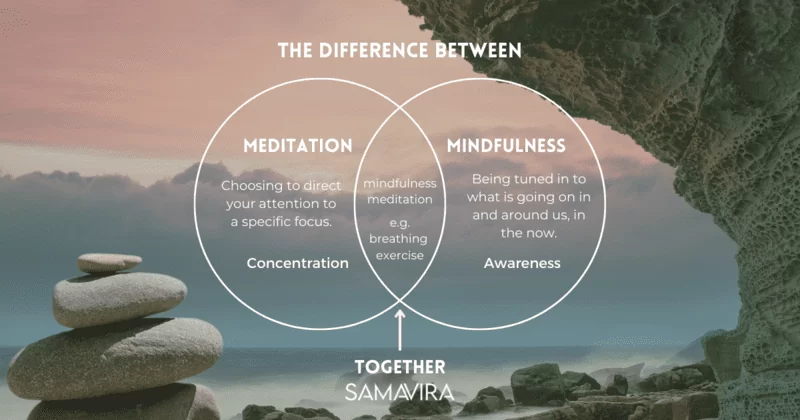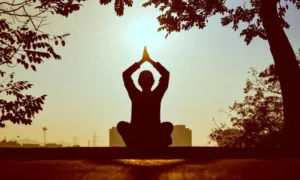What is meditation? Its true meaning, common myths and more
What is Meditation?
Meditation can be defined as an age-old practice that has been used for thousands of years by various cultures and religions around the world. Its origins can be traced back to ancient civilizations in India, China, and other parts of Asia, where it was used as a tool for spiritual and personal development.
Simply put, meditation’s meaning can be defined as a practice in which an individual uses a technique – such as focusing the mind on a particular object, thought, or activity – to train attention and awareness, and achieve a mentally clear and emotionally calm and stable state. Few of the popular meditation techniques are Dhammakaya Meditation, Guided meditation, Vipassana Meditation and more.
The ancient significance of meditating varied depending on the culture and context in which it was practiced. In Hinduism, for example, meditation was seen as a path to self-realization and a way to connect with the divine. In Buddhism, meditation was used as a means of achieving enlightenment and escaping the cycle of suffering. In Taoism, meditation was used to cultivate inner peace and harmony with nature.
Now that we have clarified what meditation is, you can also read about the numerous benefits of meditation for both the mind and body below:
1. Reduced stress and relaxation: Meditation can help reduce stress and promote relaxation by calming the mind and slowing down the body’s physiological responses to stress. This can result in reduced levels of anxiety, fatigue, and an overall increased sense of calm and well-being.
2. Self-awareness and self-reflection: By knowing how to meditate and regular practice, individuals can become more self-aware and introspective, gaining insights into their thoughts, feelings, and behaviors. This self-reflection can lead to personal growth, increased self-esteem, and improved relationships with others.

3. Physical benefits: Meditation has been shown to have physical benefits, such as reducing blood pressure, improving sleep quality, and boosting the immune system. It can also help alleviate symptoms of chronic pain and improve overall physical health.
4. A pause from daily hustle: Meditation provides a much-needed break from the daily hustle and bustle, allowing individuals to step back and take a moment to quiet their minds and connect with the present moment. This can lead to increased focus, creativity, and productivity.
Overall, knowing what meditation is and incorporating it into your daily routine can have a profound impact on both mental and physical health, providing a sense of peace, clarity, and overall well-being. To help you understand meditation’s meaning some more, read about the various meditation methods and processes below.
Various Meditation Methods And Processes
Meditation is practiced in a variety of ways, with different techniques and traditions emphasizing various aspects of the practice. Here are some of the most common methods of meditation:
1. Dhammakaya Meditation: Dhammakaya meditation is a traditional Buddhist practice. It involves visualizing a crystal or a bright light at the center of the body, with the aim of developing concentration, awareness, and inner peace.
2. Guided Meditation: Guided meditation involves a teacher or recording providing verbal guidance. The focus is on guiding the meditator through visualizations or other techniques intended to cultivate relaxation, concentration, and inner peace.
3. Vipassana Meditation: Vipassana is a traditional Buddhist meditation technique that involves observing the breath and bodily sensations, with the aim of developing mindfulness and insight into the nature of reality.
4. Transcendental Meditation: Transcendental Meditation (TM) is a popular form of meditation that involves the use of a mantra, a word or sound repeated silently, with the aim of quieting the mind and achieving a deep state of relaxation.
5. Zen Meditation: Zen meditation, or Zazen, is a form of seated meditation that emphasizes stillness, concentration, and the cultivation of awareness. It often involves focusing on the breath, as well as on the present moment and the body’s sensations.
6. Present-Moment Meditation: Present-moment meditation is a technique that involves focusing the mind on the present moment, without judgment or distraction. It can be practiced while engaged in a variety of activities, such as walking, eating, or simply sitting and observing the present moment.
While the specific techniques and traditions of meditation vary, the common goal is to cultivate a greater sense of inner peace, awareness, and well-being. By practicing and mastering a meditation technique, you will understand the significance and meaning of meditation deeply and reap its wide benefits.
Common myths related to meditation

The widespread appeal of meditation has led to the spread of myths and misunderstandings surrounding this practice. These misconceptions may serve as obstacles, deterring individuals from starting a meditation routine. Even those who already practice meditation may feel inadequate if they fail to attain certain unrealistic outcomes often depicted in fanciful stories. Knowing what meditation is and what it is not is essential for practitioners and teachers. Here are some common myths related to meditation:
1. Meditation means escaping thoughts: Meditation is not about stopping or escaping thoughts altogether, but rather learning to observe them without getting caught up in them. The goal is not to eliminate thoughts, but rather to cultivate a state of awareness and detachment from them.
2. The point of meditation is not just to clear or empty your mind: While some meditation techniques may involve focusing on a particular object or clearing the mind, the true aim of meditation is not to empty the mind, but rather to develop a greater sense of awareness and focus.
3. Meditation should be effortless: While meditation can be a relaxing and rejuvenating practice, it is not always easy. It requires discipline, patience, and a willingness to confront and work through difficult thoughts and emotions.
4. I have a lot on my mind, meditation won’t work for me: In fact, meditation can be especially helpful for individuals who struggle with racing thoughts or anxiety. Through regular practice, it is possible to develop greater control over the mind and cultivate a sense of inner calm.
5. Meditation is for the mind, not the body: While meditation is primarily a mental practice, it can have numerous physical benefits, such as reducing blood pressure, improving sleep, and alleviating symptoms of chronic pain. This makes sense given the mind-body connection: it has been shown there is a link between a person’s thoughts, feelings and behavior and their physical symptoms.
6. Isn’t meditating just relaxing?:While meditation can be a relaxing practice, its benefits go far beyond relaxation. Regular practice can lead to increased focus, creativity, productivity, and overall well-being.
7. Meditation takes too long: While some meditation techniques may involve longer periods of practice, it is possible to incorporate short, focused meditation sessions into even the busiest of schedules. Just a few minutes of meditation each day can make a significant difference in overall well-being.
Meditation vs. mindfulness
Meditation and mindfulness are often used interchangeably, but they are not the same thing. Here is a comparison of the two practices:
Meditation
Meditation is a mental practice that involves training the mind to focus and achieve a state of calm and relaxation. There are many different forms of meditation, including focused attention, open monitoring, and transcendental meditation. Some forms of meditation involve using a specific object or focus point, while others aim to cultivate a state of awareness and detachment from thoughts and emotions.
Mindfulness
Mindfulness is a practice that involves being fully present in the moment and observing thoughts and sensations without judgment. It is often practiced through focused attention on the breath or on bodily sensations, with the goal of developing a greater sense of awareness and acceptance.
While meditation and mindfulness share some similarities, such as the goal of cultivating a greater sense of awareness and inner peace, they differ in their techniques and focus.
Meditation encompasses a wide range of practices, while mindfulness is a specific type of meditation. Meditation may involve focusing on a particular object or visualization, while mindfulness involves observing thoughts and sensations in the present moment.

In popular culture, meditation and mindfulness are often used as the definition of meditation, leading to confusion about their differences. However, it’s important to understand that while they share some similarities, they are distinct practices with different techniques and approaches.
Conclusion
Knowing what meditation is is the first step to understanding how beneficial and impactful the practice can be. By dedicating a few moments every day, you can have an impact on your stress reduction and overall health.
Training the mind to help achieve a state of calm and relaxation, with the goal of cultivating a greater sense of awareness and inner peace has become necessary in the present where we are always ‘plugged in’.
The different forms of meditation, each with its own unique techniques and goals can be a challenging but rewarding practice that requires patience, discipline, and a willingness to confront difficult thoughts and emotions.
Through regular practice, it is possible to cultivate greater awareness, reduce stress and anxiety, and improve overall well-being. Learn how to meditate with Samavira meditation sessions.
Sign up here for our free monthly Inner Peace sessions to get started!
Enjoyed this article? Share it!
Keep reading!

5 Best Types of Music for Meditation
Meditation is a profound practice that connects the mind, body, and soul. While silence can be powerful, adding music to your meditation routine can elevate

How Meditation Can Enhance Emotional Connection in Relationships
In recent years, meditation has gained widespread attention for its profound impact on personal well-being. But did you know it can also play an important

Embracing Stillness: 4 Simple Meditation Techniques for Overcoming Cravings
Cravings can be relentless, whether you’re dealing with the urge to eat unhealthy foods, the pull of an addictive substance, or even the compulsion to

Sleep Better, Live Better: Meditation for Insomnia Relief
Insomnia affects millions of people worldwide, leading to various health issues such as fatigue, irritability, and a weakened immune system. One effective method to combat

Clarity Amidst Chaos: How to Use Meditation for Concentration and Focus
Let’s talk about why meditation for concentration and focus is important. Focus is a crucial aspect of daily life that allows individuals to concentrate their

Meditation for Emotional Resilience: A How-to Guide
Meditation is a powerful tool that can help build emotional resilience. In our daily lives, we encounter various stressors and challenges that can impact our

